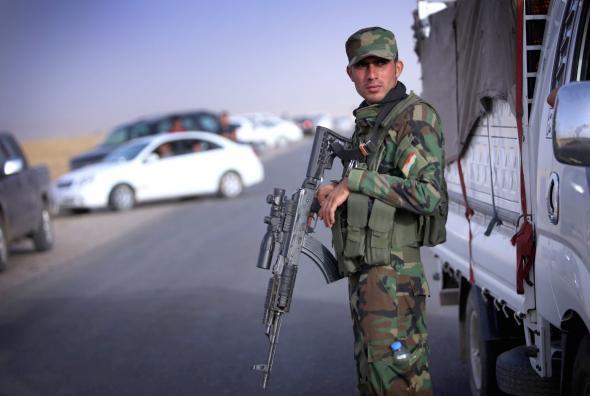Alliances in the Middle East are always a bit complex and often contradictory, but the Islamic State of Iraq and Syria’s shocking recent victories in Iraq are setting new standards for strange bedfellows. Virtually every major actor in the region has reason to be concerned about the group’s new prominence, including some who normally hate each other:
Iraq: With Fallujah, Mosul, and now Tikrit under its control, ISIS is the most serious threat that Prime Minister Nouri al-Maliki’s Iraqi government has faced since the worst days of the Iraq war.*
U.S.: The nightmare scenario for the U.S. troop pullout—that it would leave the government vulnerable to takeover by extremists—now appears to be coming true. Iraq has turned to the U.S. for more aid, but the $20 billion Washington has already poured into training and equipping Iraqi security forces doesn’t seem to have accomplished much, with reports that troops have fled their posts, leaving valuable military equipment in the militants’ hands. The U.S. has expressed concern about the events, but beyond supplying more money and guns, it’s unclear what Washington is willing to commit to the fight.
Iran: Oddly, the two primary backers of Maliki’s Shiite-dominated government are the U.S. and its longtime foe Iran, which has good reason to fear a Sunni-dominated extremist group coming to power next door. Just weeks after Maliki traveled to Washington to lobby for more military funding last November, his government inked a $195 million weapons deal with Iran, in violation of a U.N. arms embargo on the Islamic Republic. Iran is now calling for an international effort to stop ISIS.
The Syrian government: Some suspect that Bashar al-Assad allowed or even facilitated the rise of ISIS in order to divide the rebel movement, but in the long run, it’s hard to see him tolerating a situation in which a large swath of his territory is effectively outside of government control.
The Syrian rebels: Both moderate and Islamist rebel groups have clashed with ISIS over control of territory and resources inside Syria. Plus, the group’s prominence makes international funders less likely to support the anti-Assad forces.
The Kurds: The semi-autonomous Kurdistan Regional Government is locked in a bitter dispute with Baghdad over oil revenues. Syrian Kurds have also been fighting against Assad. But ISIS is moving into Kurdish-controlled areas, and the Peshmerga—Iraqi Kurdistan’s armed forces—have been deployed to help contain the insurgency, perhaps allowing the KRG to extract more concessions from Baghdad in the future.
Turkey: ISIS fighters kidnapped the staff of the Turkish consulate in Mosul today, a day after kidnapping 28 Turkish truck drivers. Prime Minister Recep Tayyip Erdogan’s government, which has been one of the most important backers of the anti-Assad rebellion, is holding emergency meetings over the crisis.
Europe: European governments, particularly Britain and France, have recently announced efforts to prevent their citizens from traveling to Syria to join rebel groups, and ISIS, with its international goals and social media savvy, appears to be the top recruiter of foreigners. The suspect held in the attack on a Jewish museum in Brussels last month had spent time fighting with ISIS in Syria.
Saudi Arabia: Maliki has accused the Saudi government, along with Qatar, of supporting ISIS, but the kingdom has lately become warier about supporting Islamist groups in Syria and announced in May that it had dismantled an ISIS-linked terror cell in in Saudi Arabia.
Israel: As you might expect, ISIS is not a big fan of the Jewish state, and Israel is reportedly cultivating ties with moderate Syrian rebel groups in order to counter its influence.*
Al-Qaida: ISIS is often referred to in news reports as “al-Qaida-linked,” and indeed it began as an offshoot of al-Qaida in Iraq, the group once led by Abu Musab al-Zarqawi, but al-Qaida central actually disavowed the group in March. ISIS had defied instructions from al-Qaida leader Ayman al-Zawahiri, who wanted to merge it with another Islamist rebel group, the al-Nusra front. ISIS, meanwhile, has publicly blamed Zawahiri for the infighting between Syrian rebel groups.
Or as one commentator has put it, ISIS suddenly seems to be in a “war against everyone.”
Clearly the group must have some international support. As journalist Hassan Hassan notes in the National, there are likely “donors with deep pockets” who “prefer to sponsor an Islamic state in the making rather than a project for one.” But it’s still a remarkable development that can get all the actors above on the same page.
On the other hand, the deep-seated resentments and enmities between these groups may make it impossible to coordinate a unified response to the threat ISIS poses. Certainly no such response has presented itself so far.
The only way to win a war against everyone is to assure that they continue to be at war with each other.
*Correction, June 11, 2014: This post originally misstated that Israel was not cultivating ties with moderate Syrian rebel groups. It is. The post also misspelled Tikrit, Iraq.
